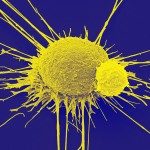Lien vers Pubmed [PMID] – 27880797
Lien DOI – 10.1371/journal.pone.0167003
PLoS One 2016 ; 11(11): e0167003
We investigated the ability of monoclonal B cells to restore primary and secondary T-cell dependent antibody responses in adoptive immune-deficient hosts. Priming induced B cell activation and expansion, AID expression, antibody production and the generation of IgM+IgG- and IgM-IgG+ antigen-experienced B-cell subsets that persisted in the lymphopenic environment by cell division. Upon secondary transfer and recall the IgM-IgG+ cells responded by the production of antigen-specific IgG while the IgM+ memory cells secreted mainly IgM and little IgG, but generated new B cells expressing germinal center markers. The recall responses were more efficient if the antigenic boost was delayed suggesting that a period of adaptation is necessary before the transferred cells are able to respond. Overall these findings indicate that reconstitution of a functional and complete memory pool requires transfer of all different antigen-experienced B cell subsets. We also found that the size of the memory B cell pool did not rely on the number of the responding naïve B cells, suggesting autonomous homeostatic controls for naïve and memory B cells. By reconstituting a stable memory B cell pool in immune-deficient hosts using a monoclonal high-affinity B cell population we demonstrate the potential value of B cell adoptive immunotherapy.


